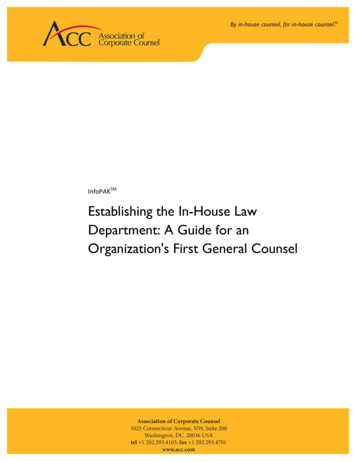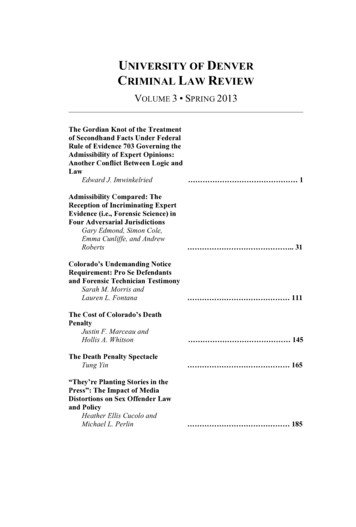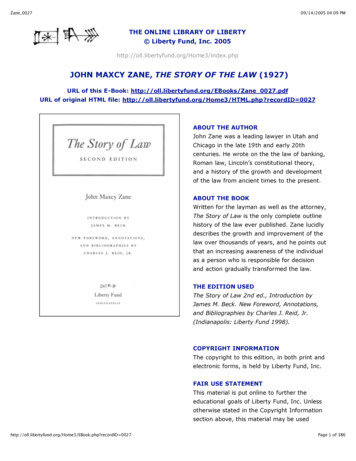
Transcription
By in-housein-house counsel,counsel, forfor in-housein-house counsel.counsel. ByInfoPAKSMEstablishing the In-House LawDepartment: A Guide for anOrganization's First General CounselAssociation of Corporate CounselAssociation of Corporate Counsel1025 Connecticut Avenue, NW, Suite 2001025 Connecticut Avenue, NW, Suite 200Washington, DC 20036 USAWashington, DC 20036 USAtel 1 202.293.4103, fax 1 202.293.4701tel 1 202.293.4103, fax 1 202.293.4701www.acc.comwww.acc.com
2Establishing the In-House Law Department: A Guide for an Organization's First General CounselEstablishing the In-House Law Department: AGuide for an Organization's First GeneralCounselUpdated July 2012Provided by the Association of Corporate Counsel1025 Connecticut Avenue, NW, Suite 200Washington, DC 20036 USAtel 1 202.293.4103fax 1 202.293.4107www.acc.comThe first general counsel of an organization has a very important and difficult task—theymust create the position that will guide their company legally and advise them in theirbusiness, without precedent and typically, without established structures or guidance.Whether the attorney hired to create the organization’s first in-house legal department hasserved as in-house counsel previously or not, creating the new in-house legal function canbe both daunting and fraught with challenges. This InfoPAK seeks to guide the attorneythrough this process, addressing the range of topics he/she will encounter, fromunderstanding company expectations to how to communicate with the new client toestablishing budgets and processes. In addition, this InfoPAK includes firsthandexperiences shared by five in-house counsel who served as their organizations’ first GC,ranging in experience, industry/company size, and perspective.The information in this InfoPAK should not be construed as legal advice or legal opinion onspecific facts, and should not be considered representative of the views of ACC or any of itslawyers, unless expressly stated. Further, this InfoPAK is not intended as a definitivestatement on the subject, but is intended to serve as a tool for readers, providing practicalinformation to the in‐house practitioner.This InfoPAK was written by Sabrina L. Bosse, Assistant General Counsel, Association ofCorporate Counsel (ACC), with the assistance of Eric Duncan and Nicholai Diamond, 2011Summer Law Clerks, ACC. For additional information, please see the “About ACC” sectionof this InfoPAK or visit www.acc.com.A special thanks to the following ACC members for their generous contributions in sharingtheir insights on the role of the first General Counsel:Craig Long, General Counsel, Capital Financial Service CorporationMaria Pasquale, Senior Vice President Legal & Chief Counsel, Celgene CorporationCatherine Valentine, Vice President Legal & General Counsel, Logitech, Inc.Nicolas Vanasse, Vice President, Chief Legal Officer and Corporate Secretary,Aveos Fleet Performance, Inc.Copyright 2012 Association of Corporate Counsel
3ContentsI.Introduction . 6II.Understanding the Role of a First General Counsel . 7A.B.C.III.Company Expectations . 71.General Expectations . 72.Understanding Company-Specific Expectations . 103.Managing Expectations . 12What Can a First General Counsel Offer? . 151.Key Roles of In-House Counsel . 152.Quantifying Benefits and Demonstrating Law Department Value . 17Law Firm Partner v. General Counsel: How Are They Different? . 19Getting Started as the First General Counsel . 21A.Codify Expectations . 21B.Understand Company Culture . 22C.Learn About Your Company’s Business Operations. 23D.1.Observe the Operations . 242.Talk to Managers and Department Heads . 243.Look Through Files . 254.Identify the Most Influential Company Executives . 255.Read Corporate Documents and Public Filings . 25Learn About Your Company’s Industry, Market, and Strategy . 261.Industry Knowledge . 272.Competitor Knowledge . 283.Company Strategy and Direction . 294.Business Unit Strategy and Direction . 30E.Promulgate a Law Department Mission Statement . 31F.Establish Reporting Relationships. 321.To Whom Does the General Counsel Report? . 322.Which Functions Report to the General Counsel? . 34For more ACC InfoPAKs, please visit http://www.acc.com/infopaks
4Establishing the In-House Law Department: A Guide for an Organization's First General CounselIV.G.Creating Company Policies . 35H.Suggested Timeline of Priorities for the First Year. 36Building Client Relationships . 38A.Openly Communicate with Clients . 38B.Market the Law Department . 39C.D.V.Introducing and Explaining Law Department Processes. 392.Conveying a Law Department Culture . 40Set the Right Law Department Standards . 411.Demonstrate a Willingness to Assume Risk . 412.Run an Approachable, Open-Door Department . 413.Set the Standard for Excellence . 42Measure and Increase Client Satisfaction . 421.Surveying Client Satisfaction . 422.Increasing Client Satisfaction . 42Identifying and Managing Responsibilities . 43A.B.C.VI.1.Overview of Typical Business and Legal Responsibilities . 431.Legal Responsibilities . 432.Business Responsibilities . 44Prioritizing Work . 441.Needs Assessment . 452.Prioritization of Needs . 46Budgeting . 461.Overcoming Preliminary Budgeting Challenges . 462.Developing a Budgeting Process . 473.Sticking to the Budget. 53Managing Outside Counsel . 54A.B.Engaging Outside Counsel . 541.Assessing Whether a Matter should be Outsourced or Handled Internally . 542.Evaluating and Selecting Outside Counsel . 56Supervising Outside Counsel . 56Copyright 2012 Association of Corporate Counsel
5VII.B.IX.Preparing Outside Counsel Guidelines . 562.Drafting An Outside Counsel Retention Agreement. 573.Implementing Strategies to Manage Outside Counsel . 58Developing the Law Department . 59A.VIII.1.Staffing the New Law Department . 591.Hiring Attorneys . 592.Hiring Other Staff Members . 643.Recruiting and Retaining Employees . 68Technology . 70Ethics and Advocacy . 70A.Combining Roles as a Business Advisor and a Legal Advocate . 70B.Attorney-Client Privilege . 71C.Multijurisdictional Practice . 72Sample Forms . 73A.General Counsel Job Description . 73B.Sample Mission Statement . 74C.Client Satisfaction Survey . 75X.About ACC . 82XI.Additional Resources . 83XII.Endnotes . 87For more ACC InfoPAKs, please visit http://www.acc.com/infopaks
6I.Establishing the In-House Law Department: A Guide for an Organization's First General CounselIntroductionThe desire to avoid the high cost of hiring outside counsel, always a powerful motivator forbusiness, is being augmented in the current corporate environment by the recent economic crisis,the need to cut costs, and the increasing need to comply with regulation stemming from thecorporate and financial scandals of the past decade. To combat this, larger companies are hiringmore lawyers to build up in-house1 legal departments to meet increasing business demands andavoid high outside counsel costs.Increasingly, lawyers are being hired for their business management experience as much as fortheir legal knowledge. Attorneys are used to ensure that their employer is meeting the morestringent requirements of securities regulations like the Sarbanes-Oxley Act of 2002 and financialregulatory reform laws like the Dodd-Frank Act of 2010. “Executive committees realize the valueof having a GC at the table and the value of being able to protect a company’s interests early on,”said Deborah Dorman-Rodriguez, senior vice president and chief legal officer of Health CareService Corp.2The first lawyer employed by a company often needs guidance in many areas, and this InfoPAKSMaims to provide that instruction. It is important to note that while in-house counsel will have wideand varied areas of focus depending upon their company, this InfoPAK is designed to offer broadadvice for any corporate counsel serving as, or thinking of accepting a position as, a company’sfirst in-house counsel/first general counsel. “New” corporate counsel may be given differenttitles, including “General Counsel” (“GC”) or various executive titles.3 They may cater to the entirecompany or only to certain business segments, and may have different previous work experience.In fact, some are not only the first GC at the company, but this is also their first in-house position(i.e., previously employed at law firms or for the government), so this resource also offers somethoughts on the differences between private and corporate in-house practice.The first general counsel hired by a company faces special challenges unlike those faced by thegeneral counsel who joins a company laterally to fill a pre-existing position. The latter generalcounsel walks into an established structure, with a set of expectations and a history of legalrepresentation. The former will need to grapple with and establish a set of cultural andoperational issues their successor will not have to address.This InfoPAK seeks to provide first general counsel with advice on how to make the most of theirposition and succeed at doing so. It also provides practical materials like sample documents, listsof issues to address, and checklists to help attorneys make the transition to working in-house.Copyright 2012 Association of Corporate Counsel
7II. Understanding the Role of a First GeneralCounselA.Company ExpectationsBefore starting as a company’s first general counsel, it is important to understand the company’sexpectations when it decided to hire an in-house attorney. This information will shape the GC’spriorities, as well as the legal department’s priorities (if there is a legal department) and enables afirst general counsel to better meet its client’s needs. Understanding company expectationsrequires ascertaining both the general traits that companies expect from in-house counsel and thecompany’s more specific expectations for the role of it’s general counsel/the legal function. Boththe general and specific expectations are explored more fully below.1. General ExpectationsIn general, companies expect in-house counsel to exhibit the following attributes, often consideredto be critical success factors (each is described in detail below): Quality Business orientation Cost sensitivity Efficiency and productivity Ability to provide strategic and proactive advice Flexibility and versatility Speed and agility, and Risk management and controls.4For more ACC InfoPAKs, please visit http://www.acc.com/infopaks
8Establishing the In-House Law Department: A Guide for an Organization's First General CounselDiagram I below depicts these key success factors and how they have evolved in terms ofimportance over time.Diagram I5 Quality: The concept of “quality” encompasses many discrete skills and attributes, suchas legal training, technical skills, professionalism, experience, judgment, client service,communication, and negotiation skills. Clients are typically not attorneys, and maytherefore have difficulty evaluating the legal knowledge and skills of in-house counseland may instead base their assessments on more measurable aspects of quality likeresponsiveness, timeliness, oral and written communication skills, personality, andability to work as part of a management team. Business Orientation: Clients often expect in-house counsel to be familiar with andcommitted to the company’s business. Thus, in-house counsel are expected to possessgreater business and management skills than outside counsel and integrate more fullywith the company and its industry. This may require participation in clientmanagement team meetings, physical visits to client sites, and frequent communicationCopyright 2012 Association of Corporate Counsel
9with key company executives. Section III(C) of this InfoPAK discusses in more detailhow to learn about a client-company’s business operations. In addition, GCs cansupplement their overall business and management skills through relevant continuingeducation programs, such as ACC’s Mini-MBA for In-House Counsel program.6 Cost Sensitivity: In-house counsel are frequently expected to produce cost savings forthe company and to manage overall inside and outside legal spending. To this end, acompany may expect its first general counsel to develop benchmarking, case/mattermanagement systems, and timekeeping tools to measure costs and communicate themto the client. ACC has a variety of resources discussing the use of tools to demonstratecost sensitivity, including the InfoPAK “Managing Value-Based Relationships withOutside Counsel.”7 Efficiency and Productivity: Clients also expect in-house counsel to be proactive ininitiating improvements and innovations as well as determining ways to streamlinerecurring work processes. For example, Craig Long, General Counsel at CapitalFinancial Services Corporation, initially built support among his clients by proactivelyproposing sample corporate policies in areas where he felt the company neededestablished procedures.8 Mr. Long’s proposals were not always accepted, but hequickly acquired a reputation for being productive and proactive.9 Meeting companyproductivity expectations may also require efficient use of paralegals and non-legalstaff, delegation of non-legal matters to other company departments, decreasing timespent on administrative tasks, avoiding redundancy, and making sure the legaldepartment is open to adding new capabilities as needed. This InfoPAK providesgreater detail on prioritizing work processes and utilizing other staff in Sections V(B)and VII(A), respectively. Flexibility and Versatility: Clients also expect in-house counsel to be able to adapt tonew innovations, especially in the areas of communications and technology. A newgeneral counsel should be ready to leverage technologies such as intranets, mattermanagement systems, and mobile devices, for example smartphones, to promoteefficiency and remain connected with clients. Speed and Agility: In part due to the recent technological advances mentioned above,clients increasingly expect fast response times from in-house counsel. Thus, a firstgeneral counsel should be prepared to utilize technology to streamline communicationwith clients and improve legal department work processes. Ability to Provide Strategic and Proactive Advice: Clients often further expect in-housecounsel to take a proactive role in advising the company’s strategic initiatives andfuture business plans. As such, it is important to have a well-defined understanding ofthe role and responsibilities of the legal department and how those responsibilitiesrelate to the company’s business operations and larger strategic plan. Sections III (D) &(E) below provide more detail on learning about company strategy and integrating thelegal department’s mission with that strategy. Risk Management and Controls: In light of increased regulatory scrutiny over the lastdecade, illustrated by the Sarbanes-Oxley and Dodd-Frank Acts, clients also expect theirFor more ACC InfoPAKs, please visit http://www.acc.com/infopaks
10 Establishing the In-House Law Department: A Guide for an Organization's First General Counselgeneral counsel to proactively manage risk and to act as the company’s “conscience” orcontrol function. In-house counsel are expected to identify a range of risks surroundingcompany activity. They should be able to provide details about the attendant risk’simpact and consequences as well suggestions for alternative approaches. For example,an ACC member who is a senior vice president and general counsel at a company in theinsurance industry (hereinafter “Mr. John Smith”10), said the company chose to hire inhouse counsel largely because senior management felt it needed someone internally tomanage risks.11 As such, Mr. Smith was initially expected to identify and manage thecompany’s risks by developing internal control policies.12 This risk managementexpectation requires a general counsel to be aware of company obligations, especiallyregarding financial reporting, and to recognize and know how to address and reportimproper conduct.It is important for a first general counsel to be prepared to meet these general expectations so theycan immediately add value for their company.2.Understanding Company-Specific ExpectationsIn addition to trying to meet the above general expectations, a first GC should ask the company thefollowing questions to clarify company-specific expectations and lay the groundwork forestablishing a successful legal department: Does the Company Want a Leader, a Manager, or Both? Leadership and managementare different roles requiring different attributes and skills. An individual withleadership capabilities might provide a vision for the legal function. Leadership willensure that the company focuses on the right priorities and often shows the rest of theorganization the “bigger picture” while not being involved in the daily details. Amanager, on the other hand, will ensure that things are done in the right way, theorganization is structured properly, and the requisite systems and procedures are inplace. Typically, the manager is focused on overseeing the process, which ofteninvolves a high level of detail and frequent communication with the staff involved. TheGC may be expected to fill both of these roles, serving in some aspects as a leader and insome aspects as a manager. Balancing these different expectations can be difficult butwith the proper preparation and organization it can be done. Will the In-House Counsel’s Primary Responsibilities Be Strategic or Transactional?A transactional lawyer helps ensure that legal work will be performed properly and in acost-effective manner. A good transactional lawyer, however, might not think or actstrategically. If the company is growing, the legal function will need to develop astrategic plan to grow with it, which may require a lawyer who is more comfortablewith a strategic role. Does the Company Have an Immediate Legal Concern or Is It Focused on the LegalFunction’s General Development? A new general counsel should ask his or hercompany if it expects to undertake any initiatives that will immediately requireCopyright 2012 Association of Corporate Counsel
11significant legal services. This can help determine which legal tasks will be a priority upfront and how much time a first general counsel will need to initially devote to urgentlegal issues as opposed to actively developing the law department. For example,Nicolas Vanasse, the first general counsel at Aveos Fleet Performance, Inc., was hiredwhen Aveos was in the process of being purchased by another company.13 As such, thecompany expected Mr. Vanasse to devote significant time to managing that transaction,which forced him to initially divert energy away from developing the company’s lawdepartment.14 Will In-House Counsel Have an Upward Focus on Executive Management and theBoard of Directors, a Focus on Managing the Legal Function, or Both? Acting as thecompany’s primary legal practitioner and chief advisor to the CEO and the Board ofDirectors may require a different set of skills and priorities than acting as the legalmanager and architect of the in-house function. For this reason, it is important to clarifywhich of these roles the company wants its first general counsel to fill. What are the Company’s “Cultural” Expectations for the New In-House Counsel? It isimportant for a new general counsel to be able to smoothly adjust to a new company’scorporate culture. It is particularly important to determine what it takes to thrive,versus just do well, in the company. Considerations include such things as thecompany’s actual primary hours of doing business (i.e., what are the hours mostemployees work rather than what hours are “technically” the company’s operatinghours), are employees expected to respond to work matters after hours, is working fromhome an accepted practice, is there a collegial environment, etc. Defining early on thetype of person who is typically successful in the company’s culture can help ensure asmooth transition. For a further discussion of this topic, see Section III.B, “UnderstandCompany Culture.” What is the Company’s Risk Tolerance? All business entails risk, and it is important todetermine how much risk the company typically assumes in its deals and how in-housecounsel will be expected to manage that risk. As is discussed in greater detail in SectionV(B) of this InfoPAK, a GC’s grasp of how much risk a company is willing to absorb iscritical to not only the GC’s specific decisions involving risk for the company, but also tothe GC’s overall approach to decision-making on behalf of the client-company. What Key Business Challenges is the Company Facing and What Type of Law WillIn-House Counsel Focus On? A first general counsel should learn about theircompany’s current industries, as well as any possible future growth strategies of thecompany. Furthermore, the GC must know what special expertise these initiatives willrequire. For example, they should determine whether the company plans to go public,wants to maximizing intellectual property assets or increase shareholder value. In suchcases, the GC will need to ensure that they are knowledgeable in corporate law(including IPOs) and be prepared for commonly occurring challenges in these areas. How Much Independence Will In-House Counsel Have? Many companies that arecreating a law department for the first time do not know exactly what to expect norunderstand every role that a new general counsel can fill. The company often has veryvague ideas of the in-house counsel’s function or may expect the new in-house counselFor more ACC InfoPAKs, please visit http://www.acc.com/infopaks
12 Establishing the In-House Law Department: A Guide for an Organization's First General Counselto be proactive in defining his or her own role. Thus, a new general counsel shoulddetermine how much independence they will have in defining their own role andresponsibilities, and can also take a proactive role in managing the client’s expectations,as discussed in the next Section below.3.Managing ExpectationsWhen a company makes the decision to hire its first in-house co
By in-house counsel, for in-house counsel. Association of Corporate Counsel 1025 Connecticut Avenue, NW, Suite 200 Washington, DC 20036 USA tel 1 202.293.4103, fax 1 202.293.4701 www.acc.com










